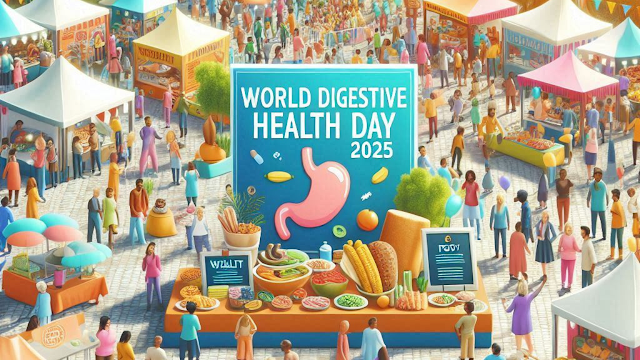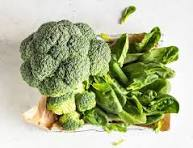Nourish Your Gut, Nourish Your Life: Celebrating World Digestive Health Day 2025
Why World Digestive Health Day Matters for all of us to great extent? Every
year on May 29, the entire world comes together to celebrate World Digestive Health Day (WDHD)—a global
event initiated by the World Gastroenterology Organisation (WGO). It’s more than just a date on the
calendar—it’s a reminder to pay attention to the core of our health: the digestive
system.
Your digestive system does more than just process the food you eat. It affects everything from your immune system to your mental health, energy levels, and even your mood. A healthy gut is a happy gut—and in 2025, this message is more crucial than ever.
“All disease begins in the gut.” – Hippocrates
Let’s explore why your gut deserves more love, how to keep it healthy, and what you can do today to contribute to a healthier, happier you.
1. Understanding the Digestive
System: Your Inner Powerhouse
The digestive system starts from the moment you take a bite of food and
continues through a complex chain reaction involving the mouth, esophagus, stomach, intestines, liver, pancreas, and gallbladder.
Key Functions:
·
Breaks down food into nutrients your
body can absorb.
·
Eliminates waste efficiently.
·
Balances good and bad bacteria via
your gut microbiome
·
Supports immunity by identifying and
fighting harmful invaders.
· Produces hormones and neurotransmitters, such as serotonin—a key mood stabilizer.
When this system is balanced, you feel energized, focused, and light. But when it's out of sync? You may experience fatigue, bloating, brain fog, or worse—chronic diseases.
“Your gut is not Las Vegas—what happens in the gut does not stay in the gut.” – Dr. Alessio Fasano
2. Why Gut Health Is More Important
Than Ever in 2025
In today’s fast-paced world, stress, processed food, erratic eating habits, and sedentary lifestyles are wreaking havoc on our digestive health.
More people are being diagnosed with:
·
IBS (Irritable Bowel Syndrome)
·
GERD (Gastro esophageal Reflux Disease)
·
Ulcerative colitis and Crohn’s disease
·
Food intolerances (like lactose or gluten
sensitivity)
What’s alarming is that even children and young adults are now facing gut-related issues once considered rare at their age.
Why this matters now:
·
Post-pandemic health awareness is
rising.
·
Mental health issues (like anxiety
and depression) are tied to gut imbalance.
· The gut-brain axis is finally getting attention in modern medicine.
3. How to Take Care of Your
Digestive Health: Simple Yet Powerful Tips
🥗 A. Eat More Fiber, the Gut’s Best Friend
Fiber feeds the good bacteria in your gut. Aim for 25–30 grams of fiber daily
through:
· Whole grains
· Fruits like apples and bananas
· Vegetables like broccoli and spinach
· Legumes like lentils and chickpeas
“Let food be thy medicine and medicine be thy food.” – Hippocrates
💧 B. Stay Hydrated
Water helps break down food and absorb nutrients more efficiently. It also
prevents constipation and keeps the digestive tract smooth.
· Aim for 8–10 glasses of water daily.
· Include hydrating foods like watermelon, cucumber, and oranges.
🧘 C. Manage Stress
Stress can throw your gut into chaos—slowing digestion or triggering issues
like acidity and IBS.
· Practice deep breathing.
·
Try meditation or yoga.
· Take tech-free breaks every day.
🚶 D. Exercise Regularly
Movement helps food move through your system and reduces bloating and
constipation.
· 30 minutes a day of walking, swimming, or cycling can do wonders.
🥛 E. Include Probiotics and Prebiotics
Probiotics are the “good” bacteria, while prebiotics feed them.
· Probiotic foods: yogurt, kefir, kimchi,
· Prebiotic foods: garlic, onions, bananas, oats
⏰ F. Eat Mindfully and on Time
Eating too fast or skipping meals disrupts digestive rhythm. Eat slowly, chew properly, and avoid eating too late at night.
“Digestion begins in the mouth, not the stomach.” – Anonymous
❌ G. Avoid Gut Killers
Minimize:
· Excess sugar and artificial sweeteners
· Processed and fried foods
· Alcohol and smoking
· Overuse of antibiotics
4. The Role of the Gut in Mental
Health: The Gut-Brain Connection
Scientists call the gut the “second brain”
for a reason. The gut and brain are connected via the vagus nerve,
and the balance of bacteria in your gut impacts how you feel emotionally.
·
90% of serotonin (the feel-good
chemical) is produced in the gut.
· Gut imbalance can lead to mood disorders, anxiety, and depression.
Keeping your gut healthy could mean keeping your mind healthy, too.
5. Listen to Your Gut: Signs Your
Digestive Health Needs Help
If you notice the following signs, it may be time to consult a doctor:
· Constant bloating
·
Frequent constipation or diarrhea
·
Sudden food sensitivities
·
Skin issues like acne or eczema
·
Fatigue and brain fog
· Bad breath (a sign of imbalance)
Your body always whispers before it screams. Don’t ignore these signs.
6. Community Involvement: Spreading
Awareness Together
For World Digestive Health Day 2025, here are some ways to
take part:
·
Host a gut health webinar in
your workplace or school.
·
Share your gut health journey
on social media.
·
Join a walkathon or yoga event
focused on wellness.
·
Cook and share a gut-friendly recipe.
· Volunteer with local NGOs focused on nutrition awareness.
The power of change lies in small, consistent actions.
“Healing is a matter of time, but it is sometimes also a matter of opportunity.” – Hippocrates
Conclusion: Your Gut Is Your Guide
This World Digestive Health Day 2025, let’s celebrate not just the system that fuels us but the silent guardian of our well-being—the digestive system.
Whether you're 15 or 50, it’s never too early—or too late—to start prioritizing your gut health. Start by making one small change today. Eat a fruit, drink more water, go for a walk, or smile more. Your gut will thank you.
Nourish your gut, and it will nourish you back—for life. 💚
Disclaimer:
This blog post is intended for informational purposes only. It does not substitute for professional medical advice, diagnosis, or treatment. Always consult with your healthcare provider before making any major lifestyle or dietary changes.






















.png)

0 Comments